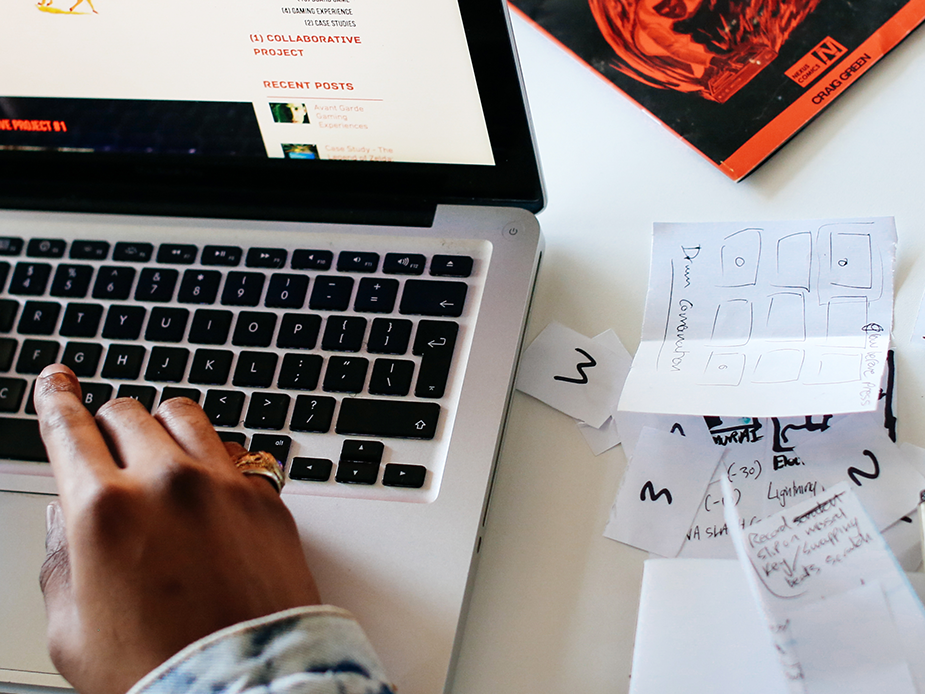
Fashion business careers: Trends and opportunities in the industry

- Written byChloe Bowen
- Published date 16 April 2025

The future of fashion
The fashion industry is constantly evolving, creating new opportunities, challenges, and competition for brands. In today’s business and fashion careers landscape, innovation, adaptability, and strong business expertise are essential for long-term success. With economic uncertainty, shifting consumer values, and the climate crisis reshaping the market, fashion brands and professionals must innovate to thrive.
Sustainability, inclusivity, and ethical production are also no longer optional. To capture the attention of modern shoppers and make a lasting impression, brands are rethinking how they create, market, and sell their products. Every major brand and viral trend that makes an impact does so with a well-executed business and marketing strategy.
But thanks to a fast-moving, digital-first society, new opportunities are emerging for marketers, brand strategists, and business owners and leaders. E-commerce, influencer collaborations, and data-driven personalisation are at the forefront with creative possibilities at every turn. Whether it’s leveraging AI-powered trend forecasting, mastering storytelling through social media or navigating global supply chains, the business of fashion is more exciting than ever.

Essential skills for fashion business careers
As the market evolves, staying ahead means continuously sharpening your expertise. Creative skills can be a powerful asset in business, fuelling innovation, unlocking new solutions, and setting you apart from the competition. Whether you're launching a fashion career, working in-house, or building your brand, combining creative vision with strong business fundamentals will equip you with the tools for a successful career in marketing, business, and fashion.
Business skills
Successful professionals utilise business fundamentals to transform ideas into practical solutions, growth, and profitable businesses.
Key business skills include:
Financial management: Understanding budgets, profit margins, and cost control when managing collections, pricing, and production.
Strategy and Leadership: Mastering strategic thinking and leadership skills to identify innovative business models, capitalise on emerging market opportunities, and drive sustainable competitive advantage.
Strategic innovation: Analysing market trends and long-term planning to create change in the global fashion industry.
Financial decision-making: Understanding financial statements, budgets and investments is critical in successful strategic and operational decisions.
Negotiation and networking: Building solid relationships with suppliers, manufacturers, buyers and customers.
Sustainable supply chain management: Ensuring ethical and responsible business practices and how business choices affect people, communities, and the environment - from sourcing materials to managing production.
Marketing skills
Knowing how to make a brand stand out in a crowded market and capture loyal customers can make or break a brand’s success.
Essential marketing skills include:
Strategic thinking: Using strategic and critical thinking to build a brand’s success by spotting opportunities, solving challenges and making practical decisions that support long-term growth.
Branding and storytelling: Crafting a compelling narrative and brand identity to build connection and consumer loyalty.
Consumer behaviour: Understanding your customers and trends, and implementing effective forecasting tools enable you to anticipate changes, be more customer-centric and create marketing approaches that resonate with today’s audiences.
Social media strategy: Understanding how to create engaging content to elevate a brand using platforms like TikTok and Meta.
Market research: Understanding target audiences, competitors, and evolving market trends ensures your designs and campaigns align with customer demand.
Business and fashion trends shaping the industry
The fashion industry is constantly shifting and shaping around complex consumer demands, industry and climate challenges and cultural movements. To progress in this fast-paced world, it’s essential to stay ahead of industry trends. From the rise of sustainable fashion to the growing influence of AI, today’s industry is more dynamic than ever. Explore the business and fashion trends that are reshaping the way we create, market, and consume fashion.
Sustainable fashion: Customers are increasingly showing loyalty towards brands that demonstrate their commitment to using eco-friendly materials, practising ethical production, and maintaining transparency in their supply chains.
Digital innovation: Shoppers’ habits are turning to the online world, prompting brands to elevate their online presence and keep consumers engaged through apps, AI, and flexible payment options.
Resale fashion: With sustainable values at the forefront of consumers' minds, shoppers are prioritising responsible practices, encouraging brands to rethink their environmental impact. Initiatives such as resale platforms, rental services and recycling platforms are proving popular.
Gamification: Used to engage customers for longer periods and build loyalty, gamification is becoming a key strategy for brands looking to retain customer interest. Whether through an app, website, or social media, gamification keeps customers involved.
AI and data-driven design: AI continues to influence everything from design processes and customer experiences to supply chain management and the catwalk. Fashion leaders are using AI to keep up with evolving demands, including sustainability solutions and creative innovation. McKinsey states AI will contribute between $150 and $275 billion USD to fashion industry profits over the next few years.
Experiential retail: Despite the decline of high-street stores, consumers still value in-store experiences where they benefit from immersive physical spaces, such as pop-ups and special (sometimes VIP) events.
Influencer and social commerce: The likes of TikTok and Instagram have enabled consumers to buy directly through social media platforms. Brands are also leveraging influencers and their power to push trends on social media, contributing to the success of brands.

Explore fashion business careers
There are a multitude of career opportunities in business and fashion. Depending on your strengths and interests, you might lean towards the following areas in fashion:
Fashion marketing careers
Digital marketing: Develops online campaigns to promote fashion brands through a multi-channel approach including social media, email, websites and search engine optimisation (SEO).
Communications: Manages brand messaging and public relations to build strong brand images.
Influencer management: Collaborates with influencers to promote products and increase brand visibility.
Brand management: Oversees a brand’s identity, strategy, and positioning to maintain consistency.
Fashion business careers
Supply chain management: Focuses on overseeing and optimising the flow of goods and information across a company’s supply network, ensuring efficiency, cost-effectiveness, and timely delivery of products. Environmental impact might be a focus for many brands too, ensuring responsible materials and fair labour practices.
Fashion business management: Handles the operation and growth of a fashion business, including strategy and financial planning and performance.
Business development: Identifies new business opportunities to drive growth and market expansion.
Fashion brand management: Develops strategies to strengthen and differentiate a fashion brand in the market.
So, whether you’re launching your fashion career, striving for growth, or establishing your own brand, there’s space for fresh ideas and innovation that make today’s fashion business careers purpose-driven and rewarding. By refining your skillset and staying ahead of trends, you can make an impact in an exciting and ever-changing field.



